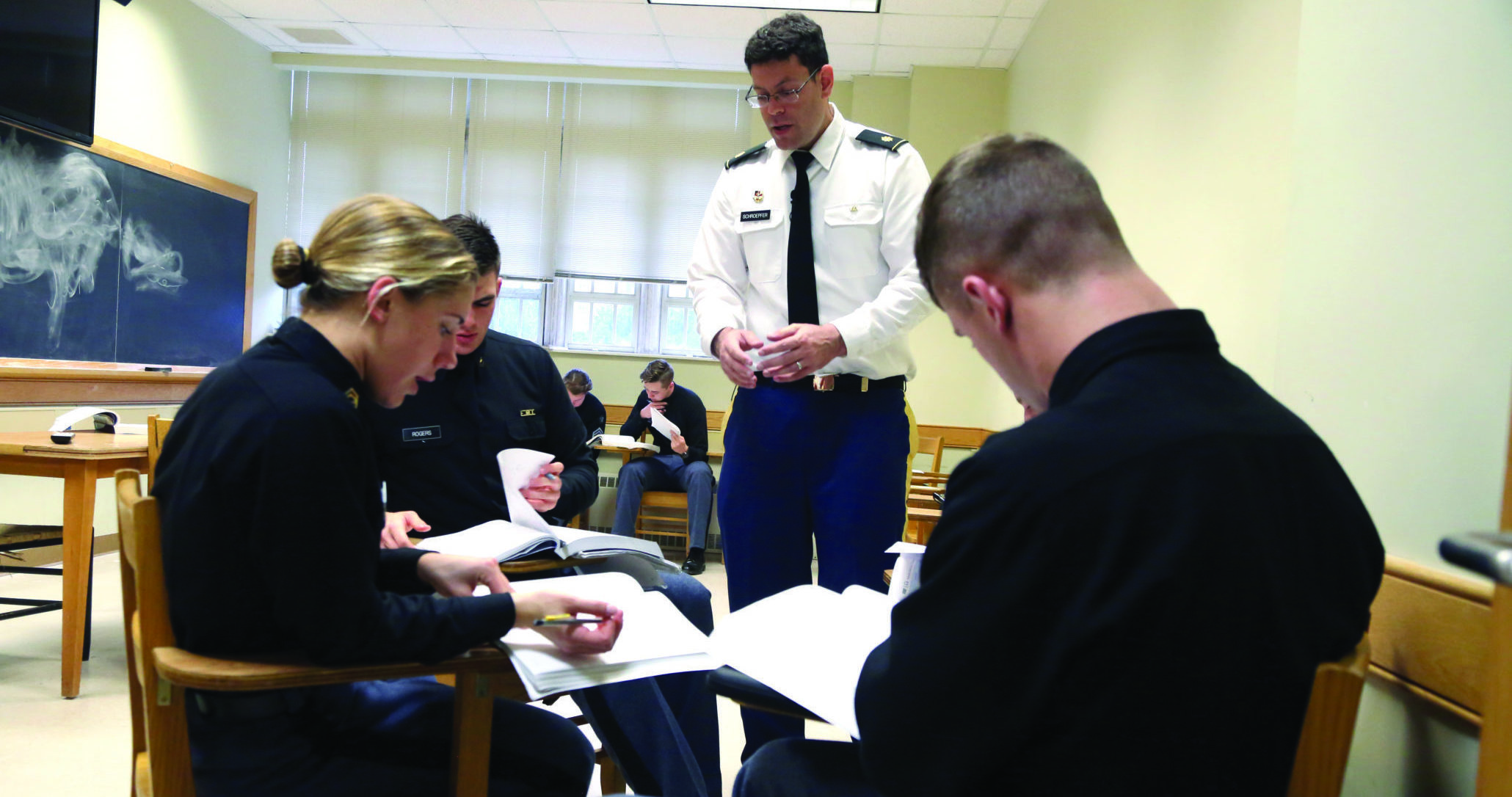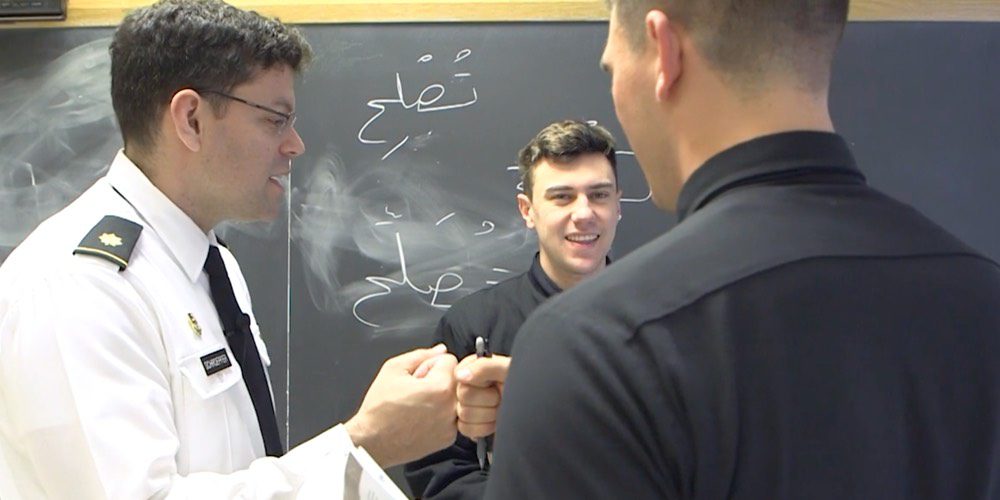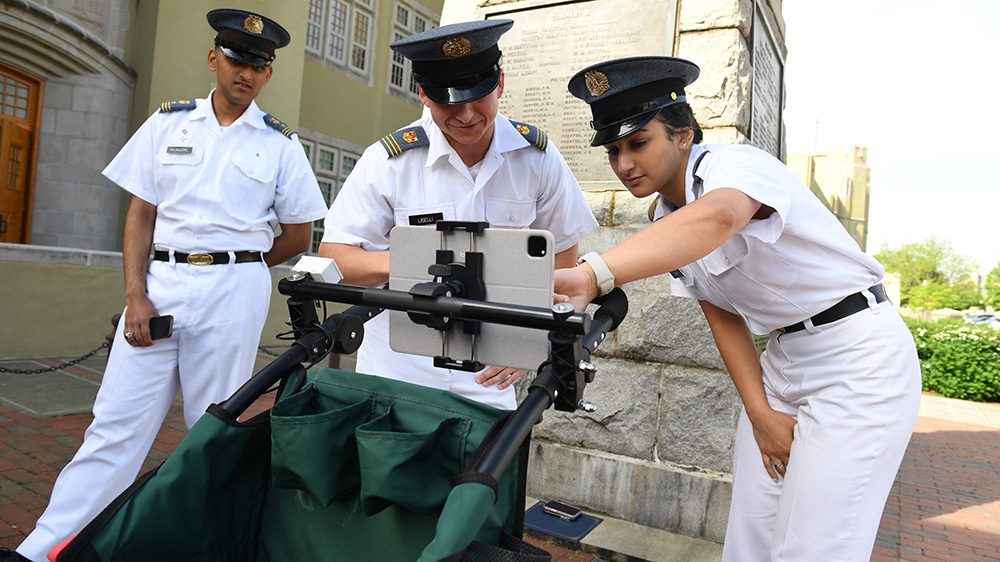Twelve years ago, Jason Schroepfer, Ph.D., had no plan to be a college professor. In fact, he admitted, he didn’t even want to go to college. However, in August 2018, he joined the VMI faculty thanks to a grant from the Jackson-Hope Fund which funded a position for a professor of Arabic in the Department of Modern Languages and Cultures.
How did this come to pass? As with most intriguing stories, it’s best to start at the beginning. Schroepfer grew up in Ramona, California, a small town in the eastern foothills of the Laguna Mountains. “When I tell people it is in San Diego County, they picture beaches,” he said, “but it’s in the high desert.”
In 2000, some friends enlisted in the Marine Corps after they graduated from high school. After their training, they were stationed at Marine Corps Air Station Miramar in eastern San Diego County. Schroepfer recalls, “I visited them in their barracks and got an idea of what life was like for them. As they told me about what they had experienced in boot camp and beyond, I became even more interested in what the Marines offered.” In his senior year in high school, “9/11 happened, and that played an additional role in my decision to enlist in 2002.”
As to becoming an Arabic military linguist, he admits, “I sort of fell into the job.” Like all enlistees, he took the Armed Services Vocational Aptitude Battery. His recruiter informed him that his score allowed him to pursue “the most intellectually rigorous jobs that the Marine Corps had to offer,” to include being a linguist. Schroepfer took the required the Defense Language Aptitude Battery that he describes as “a test that provides you with a little information about made-up languages and you have to decipher what it means.” His performance set him further apart, qualifying him to study “the most typologically different languages for English speakers such as Arabic, Chinese and Korean.”
At the Defense Language Institute in Monterey, California, he joined one of the two platoons of students then learning Arabic and embarked on 60 weeks of intensive training. After that, he was chosen to study the version of Arabic spoken in Egypt for another four months.
He was deployed to Iraq in 2006 and 2007. During his first deployment, he split his time “evenly between people and documents.” His second deployment with 1st Radio Battalion concentrated on signals intelligence.
In 2007, then-Sgt. Schroepfer decided to leave the Marines. He planned to go directly into contracting, using his expertise and experience with Arabic. However, that would have meant continuing to spend long stretches of time away from home. “I had been married for three years, but only one year total at home. So, I figured I would do something that would keep me home, and I settled on getting a bachelor’s degree.”
After a year of ensuring he had all the required courses and with an associate degree he had earned at the DLI in hand, he applied to a number of universities in his home state. Accepted at all of them, he decided to go to the University of California, Berkley. There, he majored in Near East languages and literature, focusing on Arabic and Persian. After graduating with highest distinction in December 2009, he was faced with another choice. “I asked myself, ‘Now what?’”
Schroepfer decided to continue his studies in Arabic. “I got interested in the systems behind language in college and decided that was what I wanted to do for a job whether that was working for a private company like YouTube or working for the government. Many of those positions required a master’s degree, and I pursued mine at the University of Texas.” Those three years of study included a year at the American University in Cairo – during which he applied his military language training to investigating the dialect spoken in southern Egypt. “I made it my mission to document the dialect. So, I would sit in kiosks, shops and people’s homes and record stories they would tell about life in southern Egypt. I used these recordings to write a thumbnail grammar of an undocumented dialect and study the linguistic variation in their accents.”
He then applied for the Ph.D. program in Arabic linguistics. “I thought more education could not hurt my résumé, but it wasn’t until I started writing my dissertation that I seriously considered becoming a professor.”
In August 2018, Schroepfer came to VMI as an assistant professor. While some faculty might need a period of adjustment when they come to VMI to get to know the culture, he didn’t. “In a sense, it’s almost like coming home. The feeling of being part of a team with my colleagues and with the cadets is palpable and harkens back to my Marine Corps days. You can’t readily find many places like this.”
Asked what his early impressions of the cadets have been, he replied, “I was struck immediately by the fact that the cadets work very hard. They are not afraid of taking on demanding tasks.”
“What I found most impressive, however, is how they embrace the Honor Code,” Schroepfer continued. “It is central to the culture – the mission – of VMI, and the cadets take it seriously.”

He has high hopes for the study of Arabic at the Institute. “In the department, we have 18 cadets majoring in Arabic. While that’s good for a school this size, we certainly want it to grow,” he said. “Also, we want to expose more cadets to the language.” To that end, realizing that so many cadets will spend time in Arabic-speaking countries, the MLC department received a grant to support a summer program in which three professors, including Schroepfer who will direct the program, will teach 20 cadets.
Although cadets certainly learn to speak, read and write Arabic, Schroepfer is pleased that, at VMI, culture is integral to what cadets learn. “The cadets are introduced to Arabic culture – drawn from throughout the Arabic-speaking world – and they are encouraged to study the ancient and modern history of countries of that world. It is very beneficial to this effort that we have professors from Morocco, Algeria and Iraq in the department.”
Having Washington and Lee University next door provides cadets with more opportunities to learn. “An Egyptian artist who addresses the problems in Egyptian society through his art came to Washington and Lee this year. We were able to bring cadets to his talk. That helped broaden their knowledge and deepen their appreciation of what’s going on in Egypt.”
Looking ahead, Schroepfer wants to introduce more linguistics to the curriculum. “Our cadets will find themselves in many countries in which Arabic is spoken. But, there is no generic Arabic. Just like English, it varies from place to place, often based on things like class and ethnicity. An understanding of linguistics will help them kind of pull themselves up by the bootstraps and adjust to the dialects they’ll encounter. And, that’s important because you never know who you’re going to talk to.”
-

Scott Belliveau '83 Communications Officer - Executive Projects
The communications officer supports the strategy for all communications, including web content, public relations messages and collateral pieces in order to articulate and promote the mission of the VMI Alumni Agencies and promote philanthropy among varied constituencies.




